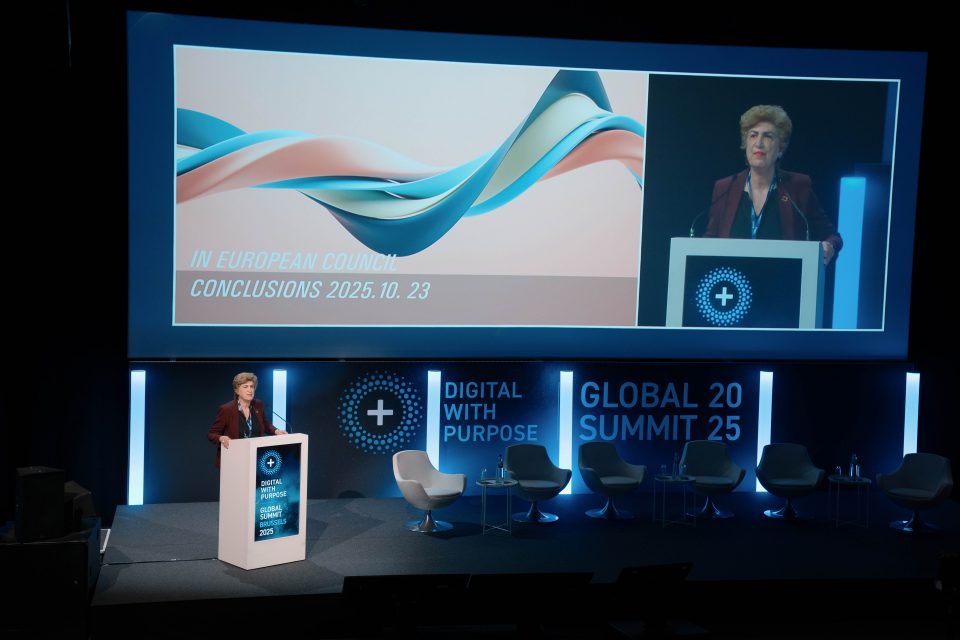“In those days, you had to leave Europe to feel European in a way. Nowadays, you can feel European in Europe”. Caroline de Gruyter, award-winning journalist and best-selling author, evoked that the first time she felt European was in the 1990s when living in the Gaza Strip. However, today the concept of Europe is clearer and its conception more common. “Europe is becoming more of a place, and a place is where you go when you want security, when you want warmth, when you want protection”. The current geopolitical situation with the war in Ukraine and in the Middle East is a testament to feeling more European because, according to Caroline de Gruyter, “sometimes you only know who you are when you know who you are not”.
In the new episode of Re-Imagine Talks, de Gruyter defended that, in Europe, identities have always been layered (local, regional, national, international) and Europeans are rather good at dealing with it. Nevertheless, the debate about Europe has been stuck in a “strange antagonism” between federalists, who want more Europe, and nationalists, who want less Europe. Since the European system is right in the middle, the interveners in this framed debate will always feel disappointed because none of them will ever fully fulfill their goal.
The author of the best-seller “Beter wordt het niet: een reis door het Habsburgse Rijk en de Europese Unie” (It doesn’t get any Better: a journey through the Habsburg Empire and European Union) believes that in multinational entities “all the decisions have to reflect the opinions of all parts”. The decision-making process must take into consideration the different histories, cultures, wishes, habits, goals, languages, etc. It happened in the Habsburg Empire and it happens in the European Union, where Member-States have to compromise while defending their own demands. In addition, citing Bridget Lathan, de Gruyter argues that the Member States must switch their perception from giving up power to Europe to adding power to Europe. “You don’t only give sovereignty to Europe; you also get sovereignty back. If Europe is more powerful, the Member States are stronger and more powerful as well”.
In light of the upcoming European Elections, the journalist conspires that the paradox between having more pro-European citizens and more prominent anti-European rhetoric politicians is a consequence of the project’s success. “Many people that didn’t care about Europe, did not follow it, did not understand it, are now making an effort”, highlighting that 72% of Europeans believe that membership is a good thing even if it is not perfect, compared to 50% of Europeans 20 years ago. “In an ironic way, the arrival of populists at the European level is due to the normalisation or adulthood of European politics”, adding that those populists don’t consider leaving the project, but aim to change from inside.
When questioned about Europe is struggling to remain relevant, the author is very assertive. One of the causes for the downfall of the Habsburg Empire was its inability to deliver what was required by the population, so they turned to nationalist movements. A similar scenario can be drawn for Europe. Even though it is perceived as a “sort of regulator, factory of laws and regulations”, Europe is providing and delivering goods and services. So, as long as it continues doing that, Europe will remain relevant. Ending on a positive note, Caroline de Gruyter added that “we are too sombre sometimes, too pessimistic. There are always challenges, but we tend to overcome them”.
Reimagine Europe is the new episode of ReImagine TALKS, a series of video podcasts launched by Re-Imagine Europa together with leading media partners and featuring some of the most innovative, influential, and original thinkers of our time, challenging conventional thinking and reimagining the concept with an unexpected and contemporary lens. The series is hosted by Erika Stäel von Holstein and Luca de Biase, RIE’s Chief Executive and Research Director, respectively. The previous episodes delved into Reimagine Capitalism with Professor Rebecca Henderson, Reimagine Power with Professor Manuel Castells, Reimagine Trust with the Internet pioneer Lisa Gansky, Reimagine Ethics with Professor Jeroen van den Hoven, Reimagine Narratives with Professor Marcin Napiórkowski, Reimagine Taxation with Professor Rita de la Feria, Reimagine Information with Professor Dino Pedreschi, Reimagine Agriculture with Professor Louise Fresco, Reimagine Democracy with Sir Geoff Mulgan and Reimagine Migration with António Vitorino.
You can watch and/or download the series at:





